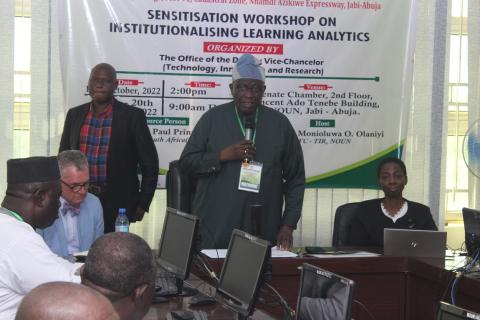
VC delivering his opening address
The Vice-Chancellor, National Open University of Nigeria (NOUN), Prof. Olufemi Peters, has challenged the academics of the university to develop themselves in the concept of learning analytics, an emerging field of research in enhancing the visibility of the university.
Peters disclosed this on Monday, October 17, 2022 during the opening ceremony of a 4-day sensitisation workshop on Institutionalising Learning Analytics.
It was organised by the office of the Deputy Vice-Chancellor, Technology, Innovation & Research (DVC-TIR), Prof. Monioluwa Olaniyi at the university’s headquarters, Jabi, Abuja.
According to the VC, the sensitisation workshop was very imperative and would seek to answer questions pertaining on “how we would ensure success of Open Distance Learning (ODL) research and achieve results that would help drive our process and improve our services, amongst others.”
Group picture of the participants with the VC
He expressed optimism that workshop will “birth a framework that would help us better define our workshop targeted with clear milestones as we work assiduously to achieve the goals of attaining one million students’ enrolment, top class service delivery and student satisfaction.
“I particularly challenge our academics to explore the opportunities of the large data pool available in our university, to contribute to our data-driven development through research as well as their own professional development that would result from publication in rated journals. This will also help improve their rating as among peers and also enhance the university’s global visibility.
“I implore you to take advantage of this useful workshop to develop yourself in the concept of learning analytics.
“It is my hope that in this workshop all stakeholders will participate actively and together we will agree to the direction we should go. This will ensure that we work as a team, knowing what we want to achieve and collectively work towards it in our respective unit.”
DVC-TIR, Prof.Monioluwa Olaniyi delivering her address
The Vice-Chancellor commended the resource person from UNISA who offered his services as contribution to community service and development of NOUN. “We hope for a rewarding and long-interaction with him in UNISA.”
In her address, Prof. Olaniyi said the general focus of learning analytics is to use data to generate insight that can lead to action, saying that there are common learning analytics data and computational approaches that would be helpful in research.
“We are technology-driven at the National Open University of Nigeria and hence, should be resourceful and innovative, while driving our processes through a research-based system,”the DVC said.
According to her, the workshop had the Vice-Chancellor and management’s high result expectations, “such that we would be able to work together as stakeholders in the NOUN-project, ensure quality service delivery and meet the target of the Vice-Chancellor’s vision of a one million student population before 2026 with higher completion rate of the registered students.
“I see this workshop as strategic to our operations as a university, and I encourage you to learn and actively participate in the activities.”
Professor Paul Prinsloo presenting his paper
She thanked the Vice-Chancellor, whom she described as “amiable and business minded”for approving the logistics for the workshop and “giving us the opportunity to up our skills and key in to trends that would impact positively on our professional and institutional development.”
The ongoing workshop, is both in-person and online as the proposed framework shall be presented to the Vice-Chancellor and Management at the end of the interaction.
In his presentation titled “Student Success in Open Distance Learning: What We Know, Should Know and May Never Know,” the resource person, a research professor in ODL, College of Economic and Management Sciences, University of South Africa (UNISA), Paul Prinsloo, identified some critical points necessary for understanding student success.
Prinsloo said “student retention is a complex, layered and dynamic set of events, international models are not necessarily appropriate to African higher education. In particular, they do not adequately recognise: The legacies of colonialism – socio-economic, education and the need for redress; The increasing digitalisation and datafication of higher education, the particularly challenging socio-economic; circumstances facing our heterogeneous and largely part-time and disadvantaged student body.”

